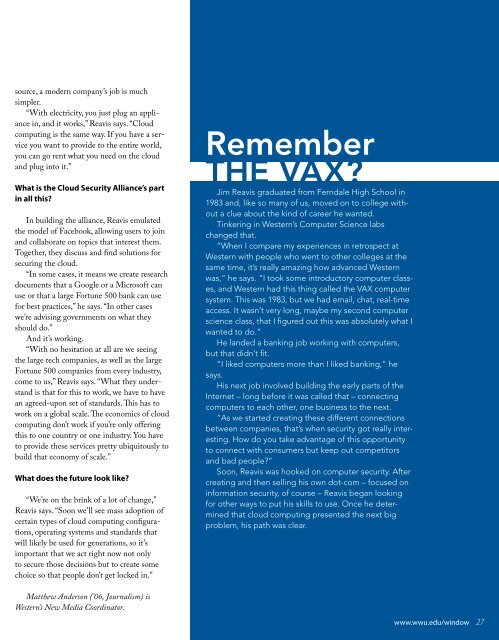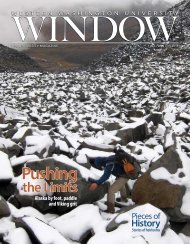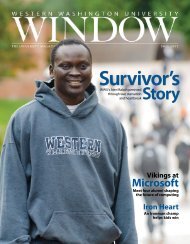BEFORE THEY’RE GONE
BEFORE THEY'RE GONE - WINDOW - The magazine for WWU
BEFORE THEY'RE GONE - WINDOW - The magazine for WWU
You also want an ePaper? Increase the reach of your titles
YUMPU automatically turns print PDFs into web optimized ePapers that Google loves.
source, a modern company’s job is much<br />
simpler.<br />
“With electricity, you just plug an appliance<br />
in, and it works,” Reavis says. “Cloud<br />
computing is the same way. If you have a service<br />
you want to provide to the entire world,<br />
you can go rent what you need on the cloud<br />
and plug into it.”<br />
What is the Cloud Security Alliance’s part<br />
in all this?<br />
In building the alliance, Reavis emulated<br />
the model of Facebook, allowing users to join<br />
and collaborate on topics that interest them.<br />
Together, they discuss and find solutions for<br />
securing the cloud.<br />
“In some cases, it means we create research<br />
documents that a Google or a Microsoft can<br />
use or that a large Fortune 500 bank can use<br />
for best practices,” he says. “In other cases<br />
we’re advising governments on what they<br />
should do.”<br />
And it’s working.<br />
“With no hesitation at all are we seeing<br />
the large tech companies, as well as the large<br />
Fortune 500 companies from every industry,<br />
come to us,” Reavis says. “What they understand<br />
is that for this to work, we have to have<br />
an agreed-upon set of standards. This has to<br />
work on a global scale. The economics of cloud<br />
computing don’t work if you’re only offering<br />
this to one country or one industry. You have<br />
to provide these services pretty ubiquitously to<br />
build that economy of scale.”<br />
What does the future look like?<br />
“We’re on the brink of a lot of change,”<br />
Reavis says. “Soon we’ll see mass adoption of<br />
certain types of cloud computing configurations,<br />
operating systems and standards that<br />
will likely be used for generations, so it’s<br />
important that we act right now not only<br />
to secure those decisions but to create some<br />
choice so that people don’t get locked in.”<br />
Matthew Anderson (’06, Journalism) is<br />
Western’s New Media Coordinator.<br />
Remember<br />
THE VAX?<br />
Jim Reavis graduated from Ferndale High School in<br />
1983 and, like so many of us, moved on to college without<br />
a clue about the kind of career he wanted.<br />
Tinkering in Western’s Computer Science labs<br />
changed that.<br />
“When I compare my experiences in retrospect at<br />
Western with people who went to other colleges at the<br />
same time, it’s really amazing how advanced Western<br />
was,” he says. “I took some introductory computer classes,<br />
and Western had this thing called the VAX computer<br />
system. This was 1983, but we had email, chat, real-time<br />
access. It wasn’t very long, maybe my second computer<br />
science class, that I figured out this was absolutely what I<br />
wanted to do.”<br />
He landed a banking job working with computers,<br />
but that didn’t fit.<br />
“I liked computers more than I liked banking,” he<br />
says.<br />
His next job involved building the early parts of the<br />
Internet – long before it was called that – connecting<br />
computers to each other, one business to the next.<br />
“As we started creating these different connections<br />
between companies, that’s when security got really interesting.<br />
How do you take advantage of this opportunity<br />
to connect with consumers but keep out competitors<br />
and bad people?”<br />
Soon, Reavis was hooked on computer security. After<br />
creating and then selling his own dot-com – focused on<br />
information security, of course – Reavis began looking<br />
for other ways to put his skills to use. Once he determined<br />
that cloud computing presented the next big<br />
problem, his path was clear.<br />
www.wwu.edu/window<br />
27








